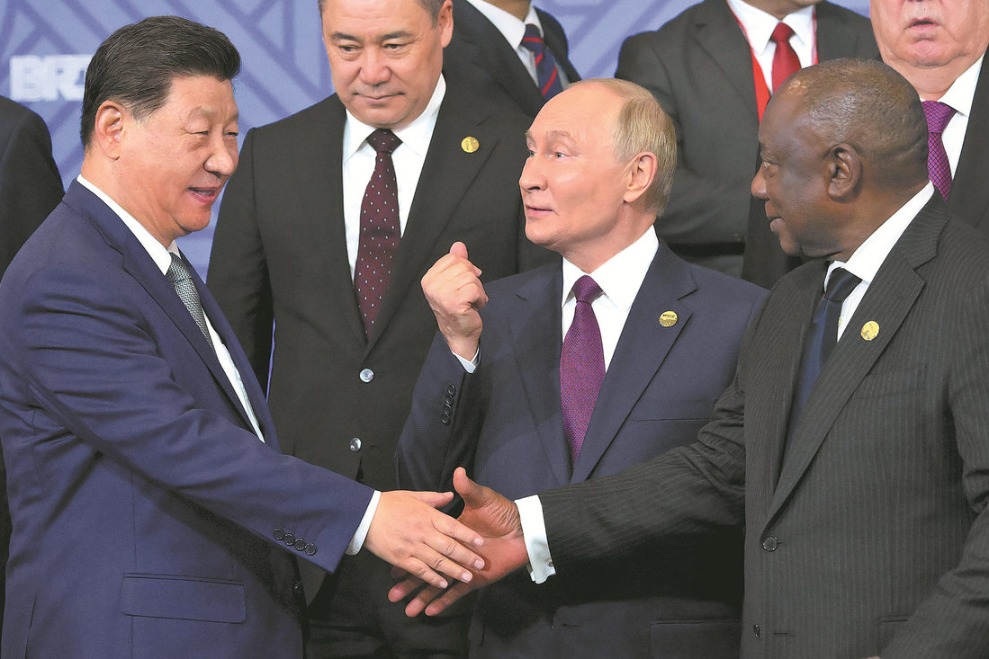US Congress' anti-China legislation calculating
Global Times | Updated: 2023-09-06 10:59

Members of US Congress, both from the House of Representatives and the Senate, often send joint letters to administrative departments to influence US policy-making on China. Since 2017, lawmakers have been frequently introducing China-related bills, convening relevant hearings, co-signing letters, shaping anti-China media discourse, creating repeated waves of anti-China sentiment. Particularly, since the 118th US Congress, the current meeting of the legislative branch of the US federal government, officially started since January this year, legislative activity concerning China has even further intensified, with the establishment of Select Committee on the Strategic Competition Between the United States and the Chinese Communist Party (the "Select Committee"), the introduction of bipartisan China Competition 2.0 bill and sanctions imposed on TikTok, all of which have had a significantly detrimental impact on China-US relations.
The influence of US Congress on policy-making toward China has notably increased. While not all proposed bills are enacted into law, the impact of these proposals on China-US relations have far exceeded any previous period in history.
Against the backdrop of the rise of China, growingly prominent political polarization and racial conflicts in the US, American policymakers have been feeling a sense of crisis. Former president Donald Trump sought to shift focus from domestic issues by making China the scapegoat, he even called China "threat to the world," thereby initiating a relentless campaign to discredit and suppress China. It is within this domestic political atmosphere that political parties found common ground on a China-related agenda and collectively raised the anti-China banner.
US Congress used to play a coordinative role in the country's foreign policies. Yet since the Trump administration, China-related issues have been elevated to a strategic level of US national security. This has, to some extent, encouraged and facilitated the Congress to push extremely negative China agendas. Take Taiwan question, congressional members introduced bills, convened hearings and even made provocative visits to Taiwan island to manipulate the Taiwan question. In 2022, then US House speaker Nancy Pelosi stubbornly made a visit to Taiwan island, under the excuse of supporting "democracy" on the island, even when Biden stated that "the military thinks it's not a good idea." However, shortly after Pelosi's Taiwan island visit, Biden officially signed the CHIPS and Science Act of 2022 into law, which aimed to decouple the global semiconductor manufacturing chain from China. An important agenda of Pelosi's Taiwan visit was to persuade semiconductor manufacturers like TSMC to actively cooperate with US chip policies. The signing of this law revealed that Biden and Pelosi were putting on a "two-man show, making political performances and collaborating with each other, and that the US has not abandoned its strategic attempts to divide China.
Under the anti-China consensus, playing the "China card" has become an electoral weapon for lawmakers to gain political capital. It not only helps garner key votes from the middle and lower classes but also gains an upper hand by attacking opponents' weaknesses toward China. Most of the top active congressional members on China-related agendas are veteran anti-China lawmakers and hold important positions in crucial congressional committees such as the House Foreign Affairs Committee and the Congressional-Executive Commission on China.
Simultaneously, there has been a growing presence of new political faces engaging in frequent China-related legislative activities. One major reason for this trend is that junior members, driven by the need to attract attention and expand their influence, frequently participate in negative China-related discussions to boost their political careers. For example, Mike Gallagher, the youngest member of the new Congressional class when he entered in 2017, has proposed numerous China-related bills, earning him the position of Chairman of the Select Committee on China.
In recent years, the US has pursued decoupling and sanctions globally, hyped up ideological competition, and designated China as an imaginary enemy, thereby instigating further disorder and division worldwide and posing a grave threat to global peace and stability. In this context, congressional influence on US policy-making toward China is more negative and damaging than at any other time in history.
These negative China-related bills convey biased value judgments and ideological stances toward China, solidifying a distorted image of China within US society, undermining China's reputation and perpetuating a vicious cycle. The bipartisan consensus on China is not a manifestation of internal unity under democratic systems but rather a strategy for parties to slice up the political interest cake. US politicians, by using the "China threat" narrative, are shifting public's attention from US domestic issue to China. This irresponsible approach not only fails to resolve their domestic issues but further exacerbates social divisions, fuels racism, fosters anti-China and anti-Asian hate crimes, and triggers turmoil and unrest within US society.
The author is an assistant researcher at the Institute of American Studies, Chinese Academy of Social Sciences.
























